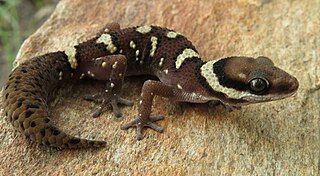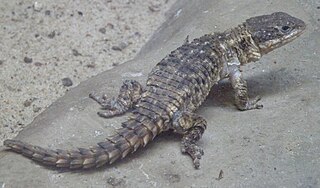
Afroedura is a genus of African geckos, lizards in the family Gekkonidae. Member species are collectively known as rock geckos or flat geckos.

Pachydactylus is a genus of insectivorous geckos, lizards in the family Gekkonidae. The genus is endemic to Africa, and member species are commonly known as thick-toed geckos. The genus also displays rich speciation, having 58 distinct species identified when compared to other closely related gecko genera like Rhoptropus, most of which have emerged since 35Ma. It has been suggested that the reason for this rich speciation not from adaptive radiation nor nonadaptive radiation, but that the genus represents a clade somewhere between the two drivers of speciation. P. bibronii geckos have been used by NASA as animal models for experimentation.

Pseudocordylus is a genus of small to large girdled lizards from South Africa, commonly known as crag lizards. Six species of Pseudocordylus are known; they are distinguished from girdled lizards of the genus Cordylus by the presence of granular scales on the back instead of osteoderms.

Holaspis is a genus of equatorial African lizards in the family Lacertidae. These lizards are capable of gliding flight for distances of 30 meters.

Ophisops elegans, commonly known as the snake-eyed lizard, is a species of lizard in the family Lacertidae. The species is endemic to the Mediterranean region and Central Asia. There are nine recognized subspecies.

The checkerboard worm lizard is a species of amphisbaenian in the family Trogonophidae. The species is monotypic within the genus Trogonophis, and is endemic to North Africa. Its natural habitats are temperate forests, Mediterranean-type shrubby vegetation, temperate grassland, sandy shores, arable land, and pastureland. It is threatened by habitat loss.

The Sekukhune flat lizard is a species of lizard in the family Cordylidae. The species is endemic to South Africa. It has two subspecies.

The Limpopo girdled lizard, also known commonly as Jones's armadillo lizard and Jones's girdled lizard, is a species of lizard in the family Cordylidae. The species is indigenous to Southern Africa.

Xenocalamus bicolor, also known commonly as the bicoloured quill-snouted snake and the slender quill-snouted snake, is a species of mildly venomous rear-fanged snake in the family Atractaspididae. The species is endemic to Africa. Four subspecies are recognized as being valid.
Vivian Frederick Maynard FitzSimons, born in Pietermaritzburg, was a notable herpetologist in South Africa. Also, he contributed to the collection of spermatophyte samples for the National Herbarium which has become part of the South African National Biodiversity Institute at the Pretoria National Botanical Garden. In 1937, together with Anna Amelia Obermeyer, he collected some of the earliest plant specimens from the Eastern Highlands of Rhodesia.
Monopeltis is a genus of amphisbaenians in the family Amphisbaenidae. Species in the genus are commonly known as worm lizards, even though they are not lizards. The genus is endemic to southern Africa. 19 species are placed in this genus.
The Mbanja worm lizard, also known commonly as Ewerbeck's round-headed worm lizard, is a species of amphisbaenian in the family Amphisbaenidae. The species is endemic to Tanzania. There are two recognized subspecies.

Lang's worm lizard is a species of amphisbaenian in the family Amphisbaenidae. The species is native to Southern Africa. There are two recognized subspecies.
Swynnerton's worm lizard, also known commonly as Swynnerton's round-headed worm lizard, is a species of amphisbaenian in the family Amphisbaenidae. The species is native to eastern Africa and southern Africa.

Monopeltis anchietae, also known commonly as Anchieta's worm lizard, Anchieta's spade-snouted worm lizard, and the Angolan spade-snouted worm lizard, is a species of amphisbaenian in the family Amphisbaenidae. The species is native to southern Africa.
Monopeltis sphenorhynchus, also known commonly as Maurice's slender worm lizard, Maurice's spade-snouted worm lizard, and the slender spade-snouted worm lizard, is a species of amphisbaenian in the family Amphisbaenidae. The species is native to southern Africa. There are two recognized subspecies.

Van Dam's dwarf worm lizard, also known commonly as the sand-dwelling dwarf worm lizard and Van Dam's round-headed worm lizard, is a species of amphisbaenian in the family Amphisbaenidae. The species is native to southern Africa. There are two recognized subspecies.

Elapsoidea sundevallii, also known commonly as Sundevall's garter snake or the African garter snake, is a species of venomous snake in the family Elapidae. The species is native to Southern Africa. There are five recognised subspecies.













